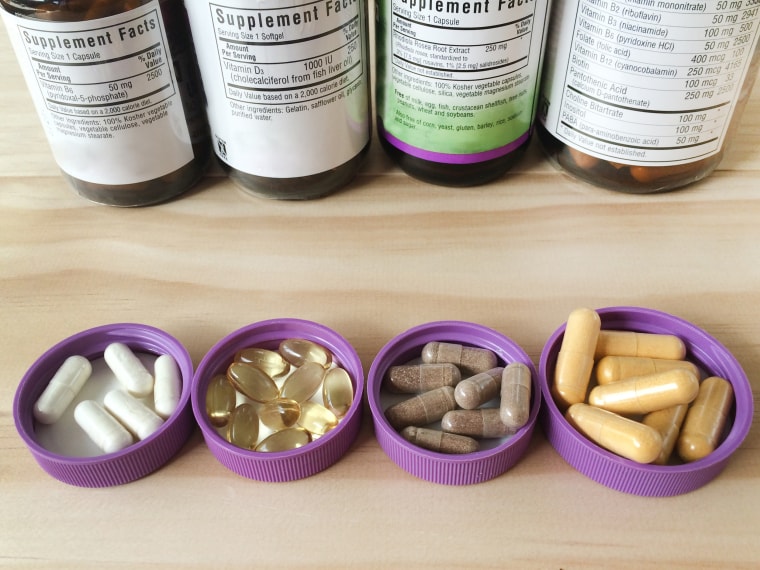Weight-loss, bodybuilding and energy supplements send thousands of teens and young adults to emergency rooms each year — more than prescription stimulants, government researchers reported Tuesday.
They calculate that 23,000 people have to go to the ER every year after something goes wrong with a supplement or vitamin pill. While many of the cases involve children who mistakenly took a supplement or older adults choking on big pills, many involved young adults looking to lose weight or stay awake, Dr. Andrew Geller of the Centers for Disease Control and Prevention and colleagues found.
“More than one quarter (28 percent) of emergency department visits for supplement-related adverse events in our study involved young adults between the ages of 20 and 34 years,” they wrote in their report, which was published in the New England Journal of Medicine.
“Weight-loss or energy products caused more than half these visits, commonly for cardiac symptoms,” they added. These included rapid heartbeat, chest pain and heart palpitations.
“Weight-loss or energy products were implicated in 71.8 percent of all emergency department visits for supplement-related adverse events involving palpitations, chest pain, or tachycardia (rapid heartbeat),” the report adds.
“These are not benign products.”
These symptoms can be caused by stimulants. Supplements are not supposed to contain active drug products and are almost always marketed as being made from “natural”, herbal or otherwise benign ingredients.
But the Food and Drug Administration has been warning consumers that many so-called natural supplements in fact do contain prescription drugs that are not marked on their labels.
“Unlike over-the-counter or prescription medications, there are no requirements to identify adverse effects on dietary-supplement packaging,” the researchers added.
While this study did not look at what people actually took, it shows even vitamins, mineral and other products found online and on drug store, grocery store and health food store shelves can cause trouble.
“Notably, cardiac symptoms were documented more frequently in emergency department visits for adverse events associated with weight loss (43 percent) and energy products (46 percent) than for prescription stimulants,” the researchers wrote.
If anything, their findings are probably an underestimate, the researchers noted. Emergency room staff rarely ask people about supplements or vitamins – unless someone is very obviously choking on one.
“This is only a limited look at the risk,” said Curtis Haas, director of pharmacy for the University of Rochester Medical Center, who was not involved in the study.
“I think it should be a concern. As you know there is limited regulatory authority over these products,” Haas told NBC News. “These are not benign products.”
The Dietary Supplement Health and Education Act (DSHEA), passed in 1994, specifically exempts vitamins and supplements from FDA's pre-marketing scrutiny, although the agency can warn against products found to be dangerous.
Yet the products are extremely popular. According to the National Center for Health Statistics, more than half of Americans took some sort of dietary supplements in 2003-2006, 40 percent of them multivitamins.
“In 2007, out-of-pocket expenditures for herbal or complementary nutritional products reached $14.8 billion, one third of the out-of-pocket expenditures for prescription drugs,” Geller’s team wrote.
“We are unable to test and identify all products marketed as dietary supplements.”
The CDC and FDA team used a national database covering 63 hospitals over 10 years, from 2004 to 2013.
“Cases were defined as emergency department visits for problems that the treating clinician explicitly attributed to the use of dietary supplements,” they wrote. The estimate excludes any long-term effects of the products and excluded deaths because the records are not precise or consistent.
Lyndsay Meyer, a spokeswoman for the FDA, says weight loss, body building and sexual enhancement products are the three types of so-called supplements that are most likely to contain unlisted, and potentially dangerous, prescription drug ingredients.
One recent warning: Fat Zero, a product whose label says it contains bee pollen, green tea and lotus seed. But the FDA found it also contains sibutramine, a prescription diet drug that was so dangerous it’s been pulled off the U.S. market for causing heart problems.
The FDA's also cautioned about sales of bulk caffeine. Caffeine in large doses can kill, and in smaller doses can cause heart symptoms such as rapid heartbeat.
Meyer noted that the agency issues warnings about some type of adulterated supplement or herbal product almost daily. The report helps the agency decide just how often such products cause bad side-effects in people who take them.
“We would love it if people would report these adverse events to us,” she told NBC News. “We are unable to test and identify all products marketed as dietary supplements.”
The FDA has a website that lists the known adulterated supplements.
People can report adverse reactions here. The FDA has created, through the Safety Reporting Portal (SRP), a convenient secure, and efficient method for letting FDA know when industry or consumers finds a problem with a dietary supplement.
“The results of this study reinforce that dietary supplements are safe products, particularly when put into context with the number of people — over 150 million Americans — who take dietary supplements every year," said Duff MacKay of the Council for Responsible Nutrition, the trade association for the supplement industry.

